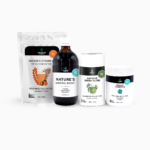Last year I was asked to write the forward for the book ‘Gut Health and Probiotics – The Science Behind the Hype’ by Jenny Tschiesche.
Jenny is the UK’s leading nutrition expert who also contributes to BBC Radio and The Guardian. I met her when I had the privilege of her attending one of my talks.
My father always says “I like that man, he thinks like I do”, and that’s how it was for Jenny and I – we had an instant rapport because we thought the same way about food, health and nutrition.
Jenny’s book is finally published you can get a copy here, but I thought as a teaser you might like to see what I wrote about this extraordinary book on gut health.
–
Nutrigenomics, epigenetics, microbiome, microbiota, gut, zonulin, lactobacillus, bifidus, autoimmunity, antibiotic resistant, glyphosate, dysbiosis, leaky gut are becoming common terms in nutrition and for people seeking health.
I’ve been a nutritionist for over three decades. I graduated with a Bachelor of Science majoring in Nutrition from Deakin University. I studied anthropology and human anatomy at other universities and the only word in the above list that was uttered in my six years of science was ‘gut’. Back then it was called the GIT (gastrointestinal tract).
We have a whole new language in nutrition and a plethora of information that is growing exponentially every year about the gut, and there is a very good reason.
Over the past two decades gut issues have been on the rise; many people have been given diagnosis, suffering with bloating, constipation, diarrhea, coeliac disease, fructose malabsorption, leaky gut, intestinal permeability, Crohn’s disease, ulcerative colitis, SIBO (small intestinal bacteria overgrowth), fat malabsorption, indigestion and cancers of the alimentary canal. This is by no means a full list, but common words we now hear.
There has also been a steady rise in systemic diseases including heart disease, diabetes, cancer and autoimmunity. Autoimmunity is a blanket term including one hundred plus diseases, most notably multiple sclerosis, type 1 diabetes, lupus, Hashimoto’s, Graves’, Addison’s, Parkinson’s and rheumatoid arthritis.
Hippocrates is the father of medicine – medical doctors take the Hippocratic oath on graduation. We know the words “first do no harm”. Hippocrates also said “all disease begins in the gut”. These words were said over 2000 years ago but none are truer than what we know today.
Modern medicine has taken only part of what this great man had to say and has forgotten that the food we eat and gut health are vital for health.
Until recently, most patients went to their doctor, described their symptoms, were diagnosed with a condition or disease, and then treated with a medication and told that diet had nothing to do with their disease or symptoms. And, just quietly, I still hear that this is going on.
Let’s just think about the first part of this statement for a minute. It’s like saying the red light on the dashboard of your motor vehicle, which indicates a problem, just needs a piece of cardboard over it to hide the indicator. It’s like putting your head in the sand and not acknowledging that a symptom is an indicator to the body that something is wrong. Rather than dulling the symptom with a medication, let’s explore the cause of the problem.
The second part of the statement is like saying that the petrol you put into a diesel car will not affect its performance. Well that’s just plain silly! Of course it will. The food you put in your body affects every cell and its biochemistry, thus affecting every system and organ. Not only do we know that the food we eat can help us with energy and building blocks for the body, but we now know that every food we consume affects our DNA. Food communicates with our DNA, our blueprint for life. It can turn on or off the messages that DNA gives the body in order to be healthy or sick – this is the wonderful new science of nutrigenomics.
A good friend of mine is a gastroenterologist and recently I asked him about his university days and what he was taught about food and the gut. He told me he was taught to diagnose and treat diseases of the gut; he was not given any information about how food affected the gut and thus the health of an individual.
But times are changing; research is showing that the gut has everything to do with not only physical health but also mental health.
It’s all very well and good to understand the anatomy and physiology of the gut, but what is becoming a burgeoning science is the ecology of the gut.
The gut has a group of residents including bacteria, viruses, parasites, fungi and yeasts. These microbes are called the microbiota; their genetic makeup is ten times greater than the genetic makeup of the human they reside within. These bugs live symbiotically with us helping us digest, fight off infection, and make vitamins, amino acids, fats and much more. We cannot live without our microbiota. The health of your microbiota is important for your overall health.
Our current lifestyle, of food produced with chemicals, chemicals in the environment and in our home, the overuse of antibiotics, the consumption of food-like substances, refined and packaged foods, lack of sleep and exercise, not enough sunlight, all contribute to a microbiota that falls into dysbiosis (gets sick). As the gut and the microbiota get sick, so do we.
Jenny Tschiesche has mastered the knowledge of the gut, its ecology and its affect on human health. This wonderful book is not only an important resource for the lay person, but should be compulsory reading for every health professional whether graduated or still at university. The information is succinct many with citations. I will be recommending this book to all my students at the Functional Nutrition Academy.
Not only does Jenny impress upon us how the gut and microbiome is being eroded and why we are seeing an increase in gut issues, but she also gives solid advice on how we can improve the integrity of the gut and microbiota.
Thomas Edison said “The doctor of the future will give no medication, but will interest his patients in the care of the human frame, diet and in the cause and prevention of disease.” This future has come, and this book will be a valuable resource to lead the way.
–
Thank you Jenny for putting the hard work in, doing all the research and simply explaining this massively important subject.
You can purchase ‘Gut Health and Probiotics – The Science Behind the Hype’ here.








0 Comments